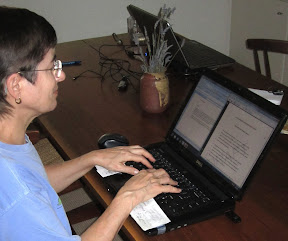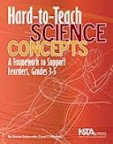Find support and share resources at the Learning Center
By Peggy Ashbrook
Posted on 2011-06-30
As I was packing up materials and readying the classrooms for summer storage I reflected back over the year and thought about the next. Developing an on-going inquiry (or overlapping inquiries because more than one class uses the space at this school) is foremost in my mind. I want to find some resources to share with the classroom teachers (who are with the classes for the entire day) so we can plan together.
 Have you had time to use any of the free resources available from the National Science Teachers Association? I like being a member of NSTA because I get one in-print journal in the mail, and all the archived journals, as well as getting discounts on the books and conference registrations. For those who are not yet members, there is still free access to the NSTA Learning Center (click here) where many of the resources are available at no cost after free registration. The teacher-to-teacher forums are a comfortable place to ask questions and offer answers to questions.
Have you had time to use any of the free resources available from the National Science Teachers Association? I like being a member of NSTA because I get one in-print journal in the mail, and all the archived journals, as well as getting discounts on the books and conference registrations. For those who are not yet members, there is still free access to the NSTA Learning Center (click here) where many of the resources are available at no cost after free registration. The teacher-to-teacher forums are a comfortable place to ask questions and offer answers to questions.
The elementary section includes preK as the youngest end of the preK-to-Grade 2 continuum of early childhood. There you can find new lessons, discuss classroom management issues in science, learn how others develop inquiry in their classrooms, find out about new resources to help you teach science and improve student achievement. Online advisors are available to help you navigate and become familiar with the Learning Center. You do NOT need to be a NSTA member to use many of the resources of the Learning Center including the discussion forums. The NSTA Learning Center is a good place to start preparing for the fall—look for reading material to be ready to teach particular topics and share strategies which worked well for you this past year.
To support your use of online professional development, let your administrators know about research firm Edvantia’s study on online professional development experiences offered by the NSTA Learning Center showing significant gains in teacher content knowledge and student learning among participants from the Houston Independent School District. Results show that the use of SciPacks—interactive web-based modules developed by NSTA and offered through its online Learning Center—significantly increased teacher content knowledge of Earth science and force and motion over the course of the study and gave teachers greater confidence in their ability to teach science.
 I’m joining the book group started by Kathy Renfrew, Elementary Math & Science Assessment Coordinator at the Vermont Department of Education, to discuss Hard to Teach Science Concepts: A framework to support learners, Grades 3-5 by Susan Koba with Carol T. Mitchell (2011, NSTA Press). (Yes, a little out of my normal range of preK-2 but I see it as a chance to learn what experiences my students in preK should have as groundwork.) I’m especially interested in the chapter, “Understanding Changes in Motion” by Rand Harrington with Susan Koba.
I’m joining the book group started by Kathy Renfrew, Elementary Math & Science Assessment Coordinator at the Vermont Department of Education, to discuss Hard to Teach Science Concepts: A framework to support learners, Grades 3-5 by Susan Koba with Carol T. Mitchell (2011, NSTA Press). (Yes, a little out of my normal range of preK-2 but I see it as a chance to learn what experiences my students in preK should have as groundwork.) I’m especially interested in the chapter, “Understanding Changes in Motion” by Rand Harrington with Susan Koba.
Kathy also began an on-going discussion of teaching physical science to kindergarteners. I’m curious—what has your experience been? Post your ideas or respond to any of the others at at the Force and Motion with Kindergarten thread in Elementary Science forum.
Peggy
Disclaimer: The views expressed in this blog post are those of the author(s) and do not necessarily reflect the official position of the National Science Teaching Association (NSTA).


